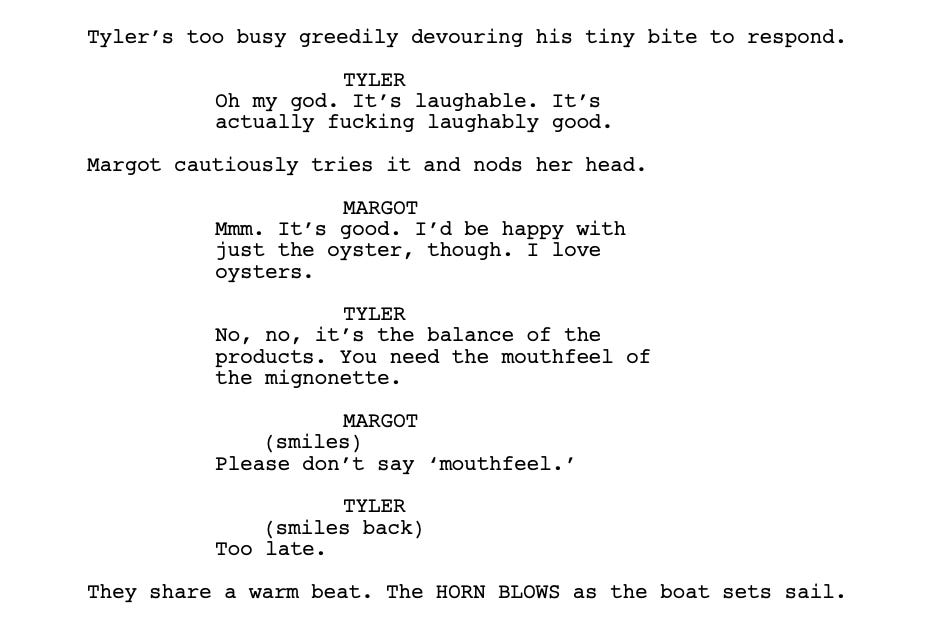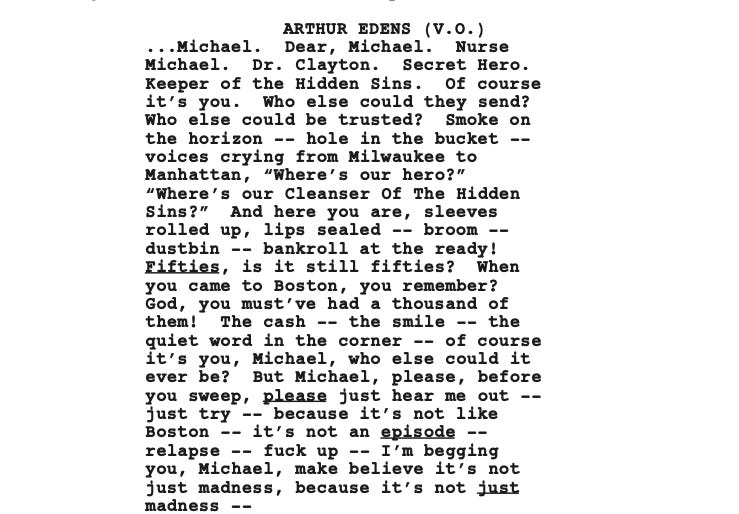"The Frankenstein Monster On The Table": Monologues And Words On A Page 2022
Breathless passages from Bardo, Andor and The Peripheral. Plus, links to the most interesting For Your Consideration screenplays
Fewer screenplays are available than in recent For Your Consideration seasons, but Oscar rules don’t specify whether the general public must have access to them.
Links below—download while you can—include Amsterdam; Armageddon Time; The Banshees Of Inisherin; The Batman; Bones And All; Empire of Light; The Fabelmans; Glass Onion; Living; The Menu; NOPE; The Northman; Pinocchio; She Said; The Son; TÁR; Thirteen Lives; Three Thousand Years Of Longing; Till; White Noise; The Woman King and Women Talking. Plus: Tony Gilroy on the “lightning bolt” necessary to transform words on the page.
Amsterdam (David O. Russell)
Armageddon Time (James Gray)
The Banshees Of Inisherin (Martin McDonagh)
The Batman (Matt Reeves & Peter Craig; previous revisions by Matt Reeves; Matt Reeves & Mattson Tomlin)
Bones And All (David Kajganich, based on the novel by Camille DeAngelis)
Empire of Light (Sam Mendes)
The Fabelmans (Steven Spielberg & Tony Kushner)
Glass Onion (Rian Johnson)
Living (Kazuo Ishiguro, based on the original screenplay Ikiru by Akira Kurosawa, Shinobu Hashimoto and Hideo Oguni)
The Menu (Seth Reiss & Will Tracy)
NOPE (Jordan Peele)
The Northman (sjón and Robert Eggers)
Pinocchio (Guillermo del Toro and Patrick McHale)
She Said (Rebecca Lenkiewicz; based on the New York Times investigation by Jodi Kantor, Megan Twohey and Rebecca Corbett)
The Son (Florian Zeller and Christopher Hampton, adapted from the play by Florian Zeller)
TÁR (Todd Field)
Thirteen Lives (William Nicholson; story by Don Macpherson and William Nicholson)
Three Thousand Years Of Longing (George Miller & Augusta Gore; adapted from “The Djinn in the Nightingale's Eye" by A. S. Byatt)
Till (Michael Reilly & Keith Beauchamp and Chinonye Chukwu)
White Noise (Noah Baumbach, adapted from the novel by Don DeLIllo)
The Woman King (Dana Stevens; story by Maria Bello and Dana Stevens)
Women Talking (Sarah Polley, from the novel by Miriam Toews)
Three extended passages of dialogue: from Bardo, False Chronicle of a Handful of Truths; “The Peripheral” and “Andor.”
In Bardo, A cartel killer in prison orange is given probably the lengthy film’s lengthiest stretch to unwind a lovingly cadenced speech, he’s able to speak the wisdom the comforted bourgeois characters assembled to hand the filmmaker an award can’t, or won’t.
You intellectuals love running your mouths about class struggle, the marginalized. Then we show up. The proletariat, the dejected, the exploited, all that’s old news. There’s something new out there, raised in the mud. Schooled on the purest illiteracy and it lurks like an alien monster on the corners of the city. You’re looking at what you might call post-poverty. What changed out in the slums? Cash. We’ve got millions. And you are all bankrupt and are led by incompetents. Do you get it? Our methods are agile. You’re slow snd bureaucratic. We don’t fear death, you’re dying of fear. We pack real guns, you pack .38s. We attack, you defend. You say human rights, we’re cruel and show no mercy. You’ve made us TV stars, we’ve made you clowns… We’ve got fifty million captive gringo junkies… We don’t forget about you, you’re our customers. You forget us as soon as the shock of the violence we provoke has passed.
The adroit adaptation of William Gibson’s “The Peripheral” includes lots of sweet swearing and Gibson-style verbiage: two characters who have just met speak this way: “You’re all rainbows and unicorns, Miss Fisher—” to which she cuts off, “Fuck off—” and he continues— “with a bougie sort of soundtrack underneath—heavy bass.”
One of the best passages is when the script makes neat explanation of material that is diffuse in Gibson’s novel, laying out the economic powers that be, “the real politique that governs us all,” after the “Jackpot” of apocalyptic forces a few years from our tim combined to reduce and concentrate the world’s population and economic power. “We live in a house with three walls,” a controlling character explains at a breakfast table, playfully arranging toast.
The Klept—oligarchy—through the application of extreme violence managed to bring order from the chaos of the Jackpot. And now in exchange for rather an open hand and blind eye when it comes to the free pursuit of profit, it helps to maintain that order. The Met, police, keeps the Klept from straying beyond certain implicit boundaries. The peace and property that results, in turn provides the technical assistance for society to function and thrive. It's a wondrous edifice we've managed to construct. [It's] also rather fragile I'm afraid.
The listener gestures at the plate. “And what's the roof meant to be?”
“It's metaphor! But the thing that will come down crashing on all of us should one of the walls ever overstep its bounds... The end of the world, Lev.”
“Oh dear... Your description of the Klept left a bit out. You mentioned the application of extreme violence. There was no shortage of that in the Jackpot, certainly. But the Klept simply succeeded where others failed through a sort of atavistic, tribal unity. Strike one of us? Strike us all? And suffer accordingly? I’m sure you could express this far more eloquently than I can... using my toast! As a prop!”
Director Vincenzo Natali provides 292 pages of his storyboards for episode 1 and 2 here. The pilot script is here. Behind-the-scenes photos here; concept art here.
And, “Andor“: anatomizing economic catastrophe, from the Resistance and in the bureaucratic hutches. In an unexpected place and moment near the of the twelve-episode series steered by Tony Gilroy, Stellan Skarsgård’s Luthan Rael speaks his mind to a minor character; the canvas of the series is reduced to one man addressing another on a weathered walkway near a shaky elevator. What have you given up for the revolution, Luthan?
Calm. Kindness. Kindship. Love. I’ve given up all chance at inner peace. I’ve made my mind a sunless space. I share my dreams with ghosts. I wake up every day to an equation I wrote fifteen years ago. For which there’s only one conclusion. I’m damned for what I do. My anger, my ego, my unwillingness to yield. My eagerness to fight, they’ve set me on a path from which there is no escape. I yearned to a a savior against injustice without contemplating the cost. And by the time I looked down. There was no longer any ground beneath my feet. What is my sacrifice! I’m condemned to use the tools of my enemy to defeat them. I burn my decency for someone else’s future. I burn my life to make a sunrise that I know I’ll never see. And the ego that started this fight will never have a mirror or an audience or the light of gratitude. So what do I sacrifice? EVERYTHING! … I need all the heroes I can get.
Opening page Michael Clayton (2007).
Tony Gilroy’s 2013 BAFTA lecture is here.
“I sold my first screenplay when I was 30. I tended bar for about five or six years, as I was figuring it out. I was changing. I’d been a musician, worked a lot of strange jobs, didn’t go to school, but I sold my first script at 30 and in that time, since then, I’ve pretty much done every single kind of screenwriting job that you can do. From page one, blank page, all the way through to a premiere, to a one-day dialogue polish for an actor you’ll never meet and a director on the phone. Everything in between. Every now and then, something comes up that is some wacky permutation on employment, but the entire Kama Sutra of Hollywood experience, I have assumed both positions as a screenwriter—top and bottom.
Anybody who makes it to this thing... Ronald Harwood doesn’t know anything, Charlie Kaufman doesn’t know anything and Abi Morgan doesn’t know anything, nobody knows anything. Because if you get here, I’m betting that you have a pretty good idea of the abyss that’s on the other side of your desk every day, and how often we fail, how often it’s just an agony.
That’s probably true—It is true, for every novelist and composer and painter and anybody who really lives by their wits in a heroic way like that. What’s the difference? The difference is that maybe we get asked about it more, and I think that the difference is also that when we finish we don’t have a beautiful 500-page manuscript or a really gorgeous painting or a symphony to show for our effort.
What we have is a strangled document that we’ve spent most of our time trying to get rid of things in, we’ve been trying to eliminate material. And it’s also nothing but... You can’t think this way while you’re working, but in the end it’s nothing but this Frankensteinian monster on the table that the lightning bolt has to bring to life.









